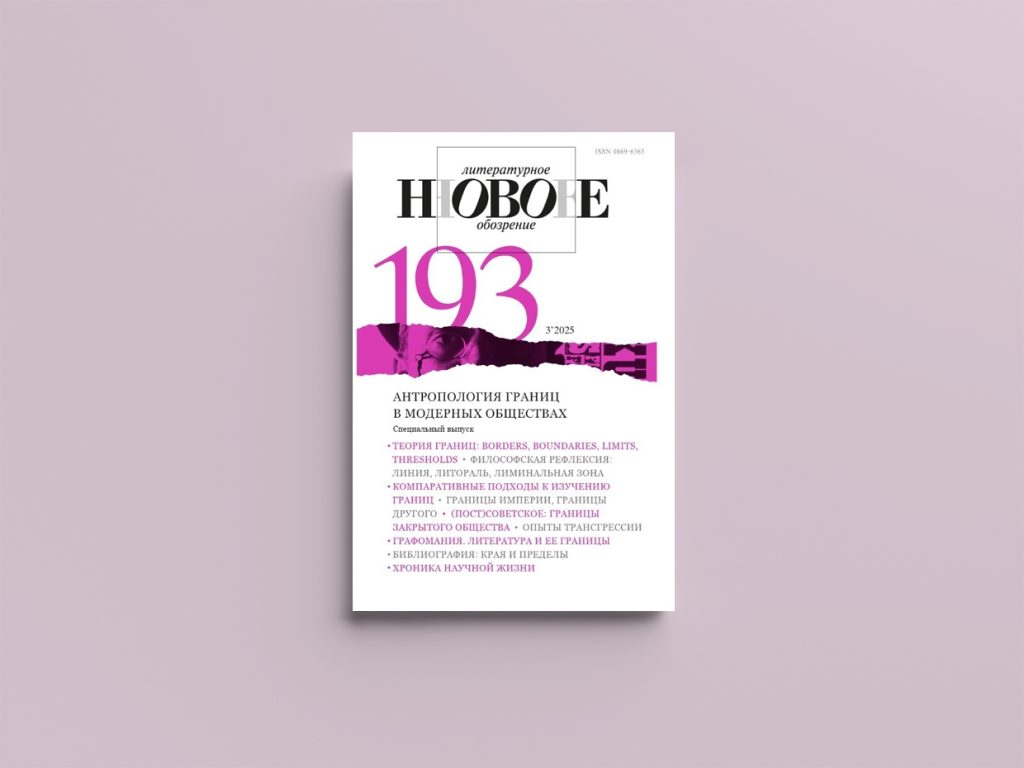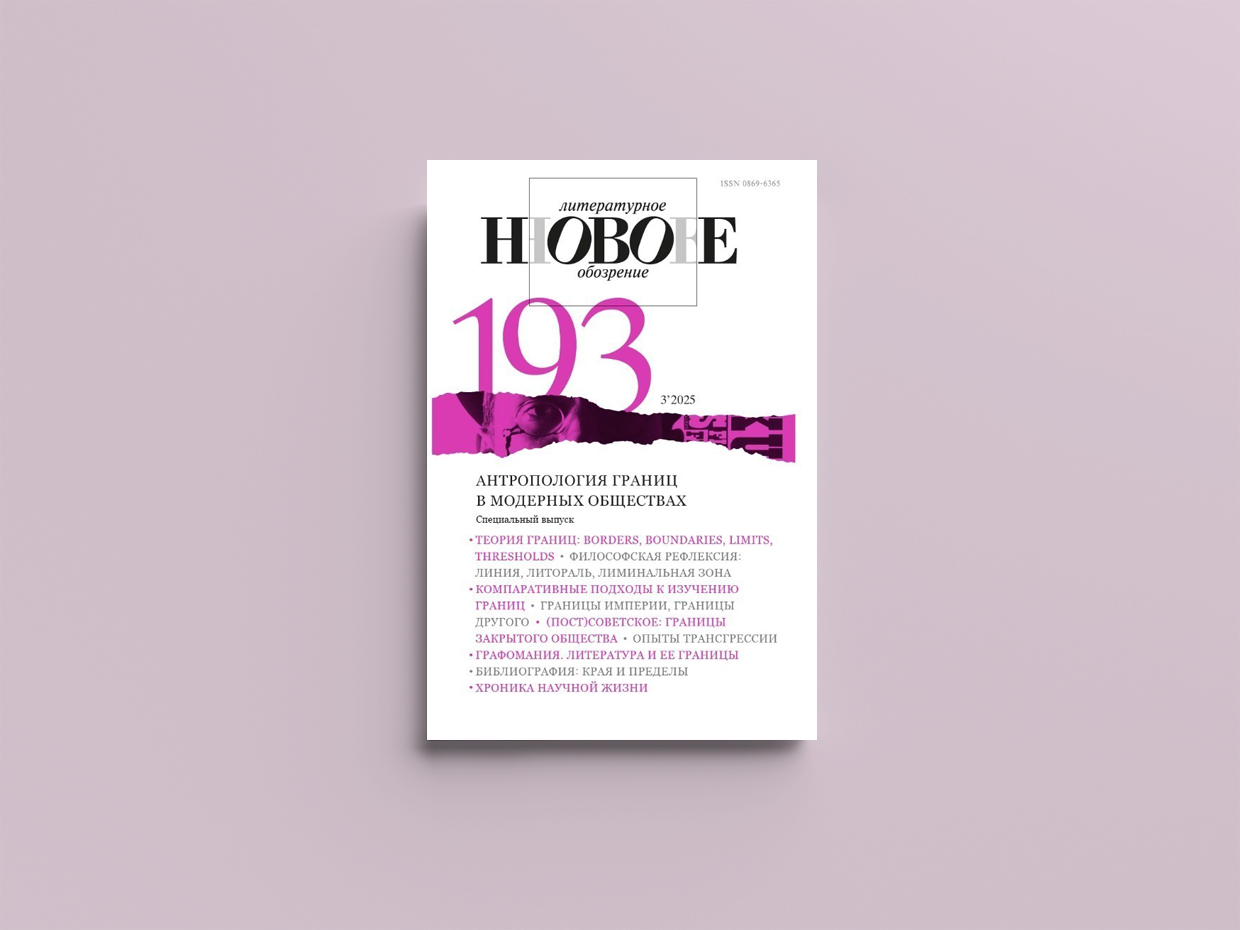In Russian the word for ‘border’, granitsa, carries a range of meanings which blur its definition as a territorial and administrative demarcation line. They include boundary, borderland, limit, margin, confine, threshold, littoral and frontier. The first syllable, gran’, translated as ‘edge’, also links granitsa to a state of being ‘on the brink’.
Taking account of these associations, the Moscow-based journal Novoe Literaturnoe Obozrenie 3/25 (New Literary Review) explores ideas about borders and boundaries in a variety of contexts: geographical, social, psychological, historical, ideological, philosophical and aesthetic.

Erasing boundaries
Stalin ruled by the numerous maps displayed in his office, observes Evegeny Dobrenko (Ca’ Foscari University of Venice) in an article on the rhetoric of kinship between the peoples of the USSR. Propaganda presented the world beyond Soviet borders as hostile and divided by national enmities, inaccessible languages and broken communication codes. Within the Soviet space, however, cultural and territorial boundaries were declared to have been erased. At the same time, the social dividing line between the nomenklatura (ruling class) and the rest of Soviet society was camouflaged.
As the Stalin regime sought to implement an exclusively Soviet brand of socialism, it repackaged the Marxist notion of the brotherhood of the proletariat for domestic purposes. There were about 130 different languages in the USSR, but the ‘rainbow of friendship’ uniting its peoples was said to transcend communication barriers. Soviet territory was treated as ‘a single acoustic space’ that could absorb linguistic variation among nationalities purportedly united by shared experience and ideological commitment.
Shared words were seen as the route to homogeneity. Paeans to a ‘super-language’ that would wipe away linguistic differences became dominant in poetry throughout the USSR, alongside praises to ‘the immortal beacon of Comrade Stalin’ and the ‘universal compassion of the Russian people’.
The merging of propaganda and literature peaked during World War II as the country’s external borders lost their previous stability. Any national or ethnic individuation was interpreted as dissent. The Ukrainian poet Volodymyr Sosyura’s poem ‘Love Ukraine’ (1944), translated into Russian in 1951, enraged the press in Moscow. Sosyura was accused of creating a boundary where none should exist.
‘The essence of nationalism lies in the aspiration to stand apart and enclose oneself in one’s own national shell, in the aspiration to see only what divides’, wrote Pravda. The Ukrainian Writers’ Union was compelled to issue an immediate response declaring that, ‘with attention and love we continue to learn the great art of literature … from Russian writers.’
‘The rhetoric of friendship was used to hide classic imperial practices’, Dobrenko concludes. ‘Although Soviet poetry insisted that “the friendship of peoples knows no borders”, when new nations rose on the ruins of the Soviet empire, borders appeared and put an end to the friendship.’
Metaphysics of oil
The ideological message that permeated and contained Soviet society created a gulf between its imagined universe and the world in which people lived and worked. In an article on the internal cultural and economic effects of the Soviet oil industry, Ilya Kalinin (visiting researcher at Humbolt University, Berlin) writes that the apparent stability of the years between the end of the Khrushchev Thaw in 1964 and glasnost in the late 1980s ‘hid a dynamic that was eroding the very foundation of the Soviet order’.
Siberian oil resources kept Soviet Union afloat, but did little to serve its population. The oil, originally discovered in the 1950s and 60s, was mostly sold abroad and used by the Soviet leadership to conserve an unwieldy, ageing system and conceal technical failures, poor production, inadequate distribution and bad management. ‘The dependence of the Soviet superstructure on oil was too significant to be acknowledged. Consequently, oil extraction was presented as production, hiding the truth about the industry … As economic dependence on oil grew, greater effort was put into its denial by the official economic and political narrative.’
The properties and potential of untapped oil reserves – fluidity, potential energy and an astonishing capacity for transformation – conferred on them ‘a magical connection with affluence and the transboundary qualities of the contemporary world’, Kalinin suggests. As facts about the industry were increasingly repressed, oil became culturally mythologised. It featured as a theme in poetry and, most notably, in Andrei Konchalovsky’s acclaimed epic film Siberiade (1979). Here, the oil image ‘spins the fibres of the story, linking its broken narrative treads’ against the backdrop of the Siberian space and its suppressed colonial history.
The region’s vast, forbidding but ultimately penetrable boundaries are revealed to be less horizontal than vertical. They lie in geological strata where the bounds of time are overstepped. To dig down is to dig into the past, but it is also to release hidden stores of liquid treasure, manifest as pillars of fire reaching into the cosmos.
The 1970s were marked by signs of backtracking from the communist model: a greater interest in the consumer ethos, national identity, religion, folk tradition and New Age spirituality. By the end of the decade, Konchalovsky was permitted to release an epic with overtly metaphysical dimensions, representing ‘a transgression of the normative boundaries of Soviet culture’. Blending documentary with art cinema, Siberiade combines a socialist realist style with the displaced tradition of the Russian avantgarde. Class conflict is seen through the optic of elemental forces and a search for the origins of the universe. Social identities dissolve as shared human origins are acknowledged.
‘The search for oil becomes a search for meaning,’ Kalinin says. ‘Political economy breaks into ontology… A narrative about production transgresses into a tale about the manifestation of the sacred.’ Oil connects. It becomes the image of a principle that moves nature and matter, a ‘magical operator catalysing transitions between the four elements … the final link in the chemical and symbolic processes of transmutation which absorb and transfigure organic matter from the ancient past, and the collective memory it holds’.
Discipline and delinquency
In the Soviet cultural context, the line between ‘the acceptable and the unacceptable, the establishment and the underground, was constantly in flux,’ writes Mark Lipovetsky (Columbia University). The consequences of crossing an ideological boundary were never predictable. Between 1955 and 1961, Andrei Sinyavsky (pseudonym Abram Tertz) wrote a series of satirical stories that earned him a seven-year prison sentence. His closed trial in 1966 – held alongside that of his fellow dissenter, Yuli Daniel – reportedly focused on the overlap between the writer’s views and those of his characters.
Lipovetsky offers a comparison between Sinyavsky/Tertz’s Fantastic Stories (Pantheon, 1963) and the work of French philosopher Michel Foucault, who wrote slightly later. The similarities lie particularly in their views about authorship, ‘delinquent’ behaviour and panopticism. In Sinyavsky’s story, ‘Graphomaniacs’ (1961), the impulse that generates an underground culture of obsessive scribbling is put down to the creative limitations imposed by the Soviet censor. ‘Thanks to censorship…we spend our lives in a fool’s paradise,’ one ‘graphomaniac’ says in the story. ‘We flatter ourselves with hopes…The state (curse it!) gives you the right to spend your life imagining yourself as an unacknowledged genius.’
Within the USSR, writing was ‘the main manifestation of agency’, Lipovetsky says, though it was also ‘paradoxically focused on an author’s withdrawal, which fulfilled the philosophical aspiration to overstep one’s own existence and move into an alternative (transcendental) dimension’. In the Soviet Union, the production of transgressive literary texts was seen as a form of social ‘delinquency’.
Sinyavsky depicts the compulsion to write as a release of suppressed energy combined with an urge to ‘eliminate’ the self in the creation of a text. Foucault expresses a similar thought in a 1969 lecture, remarking that a writer creates a space in which he constantly disappears, playing ‘the part of a dead man in the game of writing’. Equally, for Foucault, any disciplinary system incites the urge to cross its boundaries. At a systemic level, external social control penetrates individual consciousness and works to impose its own ‘truth’ on the personality. The internalized sense of surveillance it provokes can lead to a ‘delinquent’ reaction.
Within the Soviet system, which cultivated an illusion of panoptical omniscience, the officially recognised writer was a central functionary, while the unpublished scribbler emerged as his ‘delinquent double’. Sinyavsky devises an author who is ‘radically powerless but liberated into a liminal space inhabited by the marginalised and the excluded’, Lipovetsky writes.
The story Pkhents (1957) gradually unmasks a narrator who appears successively as a hunchback, a figure of mixed ethnicity, as homosexual, a migrant, a spy and ultimately an extraterrestrial. Sinyavsky’s hero is free of conventional identity. When Pkhents commits suicide, for fear of losing his essential self through assimilation into the human race, he shakes off the limits of standard perspective and perceives himself ‘from all sides, all angles at once’. The alien represents Syniavsky’s ‘prototype of the ideal author’, Lipovetsky suggests, ‘endowed with a gift of absolute disengagement, which is the foundation of literary creativity’.
Review by Irena Maryniak








